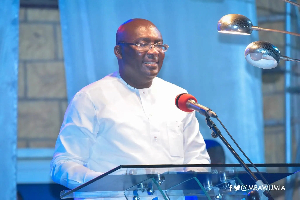 Flagbearer of the New Patriotic Party, Dr Mahamudu Bawumia
Flagbearer of the New Patriotic Party, Dr Mahamudu Bawumia
The emergence of Dr. Mahamudu Bawumia as a key figure in Ghanaian politics was heralded with great expectations. Armed with a polished resume and a calm demeanor, the economist-turned-politician sold himself as the Messiah who would rescue Ghana from economic doldrums. His rise to prominence was bolstered by a barrage of lofty promises and an avalanche of criticisms targeted at the then-incumbent government. However, eight years down the line, his political career tells a different story-a chronicle of lies, deceit, and broken promises.
The Grand Deception of 2016: Promises of an Economic Utopia
In the lead-up to the 2016 elections, Dr. Bawumia positioned himself as the ultimate critic of Ghana's economy under the John Mahama-led administration. Having been picked to partner Akufo Addo, his promises were as grandiose as they were specific:
Stabilizing the Cedi: Bawumia’s most touted claim was his ability to arrest the free fall of the cedi. He confidently declared that the cedi’s depreciation was a result of incompetence and mismanagement. However, under his stewardship as Vice President and head of the Economic Management Team, the cedi's performance has been nothing short of disastrous. As of now, November 2024, the cedi has depreciated significantly more than during the tenure of the government he criticized and exchanging at GHc17.20 to a dollar. “Wow! What a solid economic mismanagement team. Can anyone remember the NDC’s economic management team”?
Industrialization and Jobs: The much-vaunted “One District, One Factory” (1D1F) policy, which they promised would transform Ghana’s industrial landscape, has largely remained a mirage. While a handful of factories have been inaugurated, many of them were existing facilities rebranded under the program. The job creation promise associated with this policy has fallen flat, leaving millions of unemployed youths disillusioned.
Fuel Prices: In opposition, Nana Addo and Dr. Bawumia made fuel price hikes a central critique of the Mahama administration, pledging to reduce them under their watch. Yet, during their tenure, fuel prices have skyrocketed to historic levels, exacerbated by poor fiscal management and rising debt.
Post-Election Lies: Shifting Goalposts
Once in office, Bawumia’s rhetoric shifted. Many of his promises morphed into excuses:
"COVID-19 and Russia-Ukraine War": Bawumia has frequently blamed external factors such as the COVID-19 pandemic and the Russia-Ukraine war for Ghana’s economic woes. While these events undoubtedly had global repercussions, his government’s reckless borrowing and mismanagement predated these crises.
Inflation and Debt Management: He lambasted previous governments for accumulating debt but has presided over an administration that has ballooned Ghana’s debt to unsustainable levels, necessitating an embarrassing debt restructuring program and an IMF bailout.
Digitization: A Convenient Diversion: Faced with mounting criticism, Bawumia pivoted to digitization as his crowning achievement. While initiatives such as mobile money interoperability and the Ghana Card have been noteworthy, their impact on the average Ghanaian's economic well-being is negligible. These programs, though important, do not substitute for sound economic management. Even more so, these programs were started by the visionaire and pragmatist John Mahama.
Narratives: Lies That Shook the Nation
Bawumia’s political career is also riddled with blatant lies that have tarnished his credibility:
Unfounded Economic Claims: On numerous occasions, Bawumia has manipulated statistics to paint a rosier picture of the economy than reality warrants. His claims of Ghana being the fastest-growing economy in the world were contradicted by independent reports.
Plagiarized Promises: Many of the policies touted as innovative, including the Free SHS program, were already in motion before the NPP came into power. Yet, Bawumia and his boss have consistently taken credit for these initiatives while conveniently ignoring their challenges, such as overcrowded schools and declining education quality.
<Unrealized "Gold for Oil" Policy: In a bid to curb rising fuel prices, Bawumia introduced the "Gold for Oil" initiative, claiming it would reduce Ghana’s dependency on foreign exchange for petroleum imports. However, the policy has failed to make any significant impact, raising questions about its feasibility and transparency.
The Pwalugu Dam: Dr. Mahamudu Bawumia’s rhetoric surrounding the NPP’s signature project, the Pwalugu Dam in northern Ghana, epitomizes his pattern of overpromising and underdelivering. Marketed as the savior for the northern economy, Bawumia boasted that the $993 million dam would simultaneously provide irrigation for over 25,000 hectares of farmland, generate 60 megawatts of hydroelectric power, and serve as a flood control mechanism for the region.
However, years after the groundbreaking ceremony in 2019, the project remains stalled, with no significant construction to show for the grand promises. Despite repeated assurances that funding was secured and work would commence, the reality on the ground tells a different story-unfulfilled promises and a lack of accountability. The Pwalugu Dam, once touted as the "Game Changer," has become a glaring symbol of the NPP government’s inability to translate lofty ambitions into tangible development.
The Consequences of Deceit
Bawumia’s trail of broken promises has had real consequences for Ghanaians. The economic hardship under his tenure has pushed many into poverty, eroded trust in governance, and left the country on the brink of financial collapse. His penchant for lofty rhetoric without concrete results has exposed him as a politician more concerned with optics than substance.
Conclusion: A Cautionary Tale for Ghana’s Future
Dr. Mahamudu Bawumia’s political journey is a cautionary tale of how charisma and academic credentials can mask incompetence and deceit. His failure to deliver on his promises should serve as a wake-up call to Ghanaians to demand accountability and scrutinize political rhetoric. As the 2024 elections approach, it is imperative for the electorate to reflect on the reality behind the promises and ensure that only honest and wise leaders steer the nation forward.